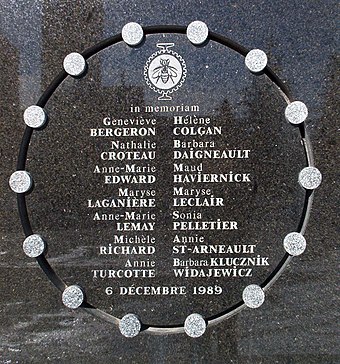Fruits of the feed:
- BY-YOUR-⌘ posts a Moon-set on flickr
- Jack Ricchiuto on four important conversations
- Rob Paterson’s remarkable harvest from the 2008 Boyd Conference
- Dirk Buchholz and his blog MediaBuzzard. A new one to me covering progressive Canadian politics.
- Susan Szpakowski on doing more with less in process and organizational design
Share:

My 14 colleagues, fellow students, peers, all women, all full of promise. I never knew any of them but their deaths touched me deeply.
I’ll never forget December 6, 1989.
Share:
This weeks gems plucked from the vine of RSS.
- Eli Gerzon on worldschooling
- Shawn Callahan on the Cynefin framework
- Jordon Cooper‘s recession survival guide.
- Rob and Laurel Bailey, my neighbours on Bowen Island, have taken their family to India in search of real Indian food and has a BRILLIANT blog charting their journey. Food, meets travel, meets young family. A daily must read for me.
Share:
Prince George, BC
Spread this request out to your networks.
I am involved with a fascinating three year project which is creating a network of learning circles across Canada to bring policy makers, practitioners and academics together around cracking the next level for urban Aboriginal economic development in Canada. We had a very successful kick off meeting in Ottawa in October and we now have some learning circles taking shape across the country.
One of the circles is located in Prince George and it’s looking at models of urban Aboriginal governance. Tonight my friends Ray Gerow, Veronica Creyke and I were talking about the fact that when most people look at governance structures, they picture a body that makes decisions and manages resources. We are very interested in looking at the way governance happens when people take responsibility for creating their futures collectively. In other words, a bottom up approach to governance that is based on networked action, governance that emerges from community and economic development in action. That is what is happening here in Prince George and we want to study it and tell the story.
The basis for this inquiry comes from an Open Space we ran here four years ago. That event was notable in that the community created 21 projects all led by community members who attracted people to help them out. Everything from resurrecting the Aboriginal Choice School idea (which is why I am here this week) to organizing drug addicts and homeless men in helping to spruce up the parks and public spaces where they live.
The champions of the action groups were completely self-selected and they later came together as a champions council and together decided how to spend the $250,000 that the federal government set aside to support these projects. It was remarkable and it lasted for two years in tha format. Since then, an organization has taken over the funding and the process has gone back to a more traditional governance model. But much of the work that was started continues on and another Open Space is in the works to revive the idea, and that made us think that the most effective governance for this urban Aboriginal community was not a structure at all but rather some form of “action governance” based in real development work.
We don’t know what any of this means or looks like, but through this project we have a chance to explore it. What we are looking for is an academic who would be eligible for a SSHRC grant to look at a very different kind of community governance, something akin to wirearchy in action but absolutely without using Web 2.0 or really any kind of social networking technology other than Open Space and other conversational social technologies. Part of my inquiry in thinking about how social technologies can come into this field and enhance the latent governance function.
If you are interested, or know someone who is, let me know. We have money and some interesting questions and we would like the story told.
Share:
Watching the news tonight and both CBC and CTV are talking about “Anger in the West” with lots of video of conservative talk show hosts in Calgary and folks in diners in Lethbridge mad as hell and not willing to take it any more.
So let me just say something, as a Westerner. The West is not a seething homogenous conservative backwater. It is not united on this issue and it not any more angry than it usually is. Callers to Dave Rutherford’s show in Calgary are always angry, because Dave Rutherford is always angry. People in diners are always cranky when you stick a camera in their face and interview them while their eggs get cold. The only time diner interviews are good news is when a local team has won a championship.
And with healthy Alberta First folks willing to shoot off their mouths at the drop of a hat, it’s fun to provoke the hypocrisy of Western seperatists who complain about Quebec seperatists, and are themselves quick to talk about taking their oil and leaving Canada in pieces.
So whatever. Are we served well by this kind of bluster and outrage? Not really.
Bottom line, is that there is anger everywhere if you look for it, but there is very little benefit gained in the midst of a Constitutional crisis by declaring the entire country west of Kenora “angry” and characteriszing us all as a bunch of reactionary rednecks. So lay off the stereotypes and let’s focus on the people on all sides that are trying to put a government together.

